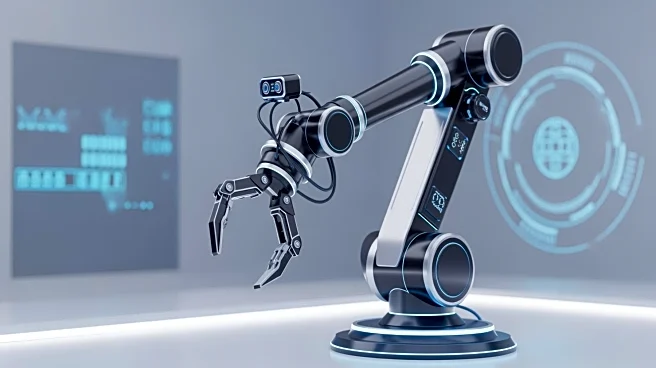What's Happening?
Figure AI, a company based in Silicon Valley, has introduced the Figure 03 robot, designed to perform household chores such as vacuuming and dishwashing. This robot is an advancement from its predecessor,
the Figure 02, which has been utilized in industrial settings like BMW factories. The Figure 03 is intended for domestic use and represents the company's ambition to mass-produce humanoid robots. Figure AI, backed by investors including Jeff Bezos and Microsoft, envisions these robots playing roles beyond household tasks, potentially contributing to healthcare and space exploration. CEO Brett Adcock anticipates a future where billions of these robots are integrated into various sectors, including space colonization.
Why It's Important?
The introduction of the Figure 03 robot marks a significant step in the evolution of robotics, particularly in domestic settings. This development could transform how household chores are managed, potentially reducing the time and effort required for such tasks. The broader implications include a shift in labor dynamics, as robots may increasingly take on roles traditionally held by humans. This could lead to changes in employment patterns and necessitate new skills in the workforce. Additionally, the integration of robots into healthcare and space exploration could drive advancements in these fields, offering new solutions and efficiencies.
What's Next?
Figure AI plans to continue developing its humanoid robots, with the goal of mass production. The company aims to expand the roles of these robots beyond household chores, integrating them into various industries. As the technology advances, stakeholders such as policymakers, businesses, and consumers will need to address the ethical and practical implications of widespread robotic integration. Discussions around regulation, workforce impact, and societal adaptation are likely to intensify as these robots become more prevalent.
Beyond the Headlines
The deployment of humanoid robots like the Figure 03 raises ethical and cultural questions about the role of technology in daily life. As robots become more capable, issues such as privacy, security, and human-robot interaction will need to be addressed. The potential for robots to perform tasks in healthcare and space exploration also opens discussions on the long-term impact on human roles in these fields. The cultural acceptance of robots in domestic settings may vary, influencing how quickly these technologies are adopted.











